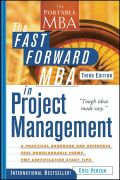
INDICE: Preface. Down Loadable Forms. Part 1. Introduction. Chapter 1. Project Management Is The New Critical Leadership Skill. Introduction. Project Management Is the Essential Skill Set for Twenty-first Century Leaders. Project Management as a Strategic Strength. The Art and Science of Project Leadership. The Practical Foundation for Successful Projects: How This Book Will Help You.Project Management Relies on Other Disciplines. End Point. Stellar Performer:Orthospot. Chapter 2. Foundation Principles Of Project Management. Introduction. Projects Require Project Management. The Evolution of a Discipline. The Definition of Success. The Cost-Schedule-Quality Equilibrium. The Ultimate Challenge: No Damage. Project Management Functions. Project Life Cycle. Organizing for Projects. Project Managers Are Leaders. End Point. Stellar Performer: Children's Hospital and Regional Medical Center. PMP Exam Prep Questions. Part 2. Defining The Project. Chapter 3. Know Your Key Stakeholders And Win Their Cooperation. Introduction. Stakeholders Are the Heart of a Successful Project. Stakeholder Roles: Project Manager. Stakeholder Roles: Project Team. Stakeholder Roles: Management. Stakeholder Roles: The Customer. Stakeholder Roles: Representatives of External Constraints. Stakeholder Roles: Advocates, Opponents, andInnocent Bystanders. Make Stakeholder Identification a Repeatable Process. Lead the Stakeholders. End Point. PMP Exam Prep Questions. Chapter 4. Write The Rules: Five Key Documents To Manage Expectations And Define Success. Introduction. Project Rules Are the Foundation. Publish a Project Charter. Write a Statement of Work. Statement of Work: Minimum Content. Responsibility Matrix. Creating a Communication Plan. The Project Proposal Launches the Project. End Point. PMP Exam Prep Questions. Part 3. The Planning Process. Chapter 5. Risk Management: Minimize The Threats To Your Project. Introduction. The Risk Management Advantage. All Project Management Is Risk Management. The Risk Management Framework. Step One: Identify the Risks. Step Two: Analyze and Prioritize the Risks. Step Three: Develop Response Plans. Step Four: Establish Contingency and Reserve. Step Five: Continuous Risk Management. End Point. Stellar Performer: The Software Engineering Institute. PMP Exam Prep Questions. Chapter 6. Work Breakdown Structure: Break Your Project Into Manageable Units Of Work. Introduction. Defining the Work Breakdown Structure. Building a Work Breakdown Structure. Criteria for a Successful Work Breakdown Structure. Work Package Size. Planning for Quality. Breaking Down Large Programs. WBS Guidelines Vary. Contractors or Vendors Can Provide a WBS. End Point. PMP Exam Prep Questions. Chapter 7. Realistic Scheduling. Introduction. Planning Overview. Planning Step Two: Identify Task Relationships. Planning Step Three: Estimate Work Packages. Planning Step Four: Calculate an Initial Schedule. Planning Step Five: Assign and Level Resources. End Point. PMP Exam Prep Questions. Chapter 8. The Art And Science Of Accurate Estimating. Introduction. Estimating Fundamentals. EstimatingTechniques. Building the Detailed Budget Estimate. Generating the Cash Flow Schedule. End Point. Stellar Performer: Tynet, Inc. Stellar Performer: Adobe Systems. PMP Exam Prep Questions. Chapter 9. Balancing The Trade-Off Among Cast,Schedule, And Quality. Introduction. Three Levels of Balancing a Project. Balancing at the Project Level. Balancing at the Business Case Level. Balancing at the Enterprise Level. End Point. Stellar Performer: SAFECO Field. Stellar Performer: Boeing 767-400ER. PMP Exam Prep Questions. Part 4. Controlling The Project. Chapter 10. Building A High-Performance Project Team. Introduction. A Framework for Building High-Performance Teams. Leadership Responsibilities. Building a Positive Team Environment. Ground Rules. Team Identity. Team ListeningSkills. Meeting Management. Summary of Building a Positive Team Environment. Collaborative Problem Solving. Problem Analysis. Decision Modes. Conflict Management. Continuous Learning. Summary of Collaborative Problem Solving. Job Satisfaction. End Point. Stellar Performer: Habitat for Humanity. PMP Exam Prep Questions. Chapter 11. Clear Communication Among Project Stakeholders. Introduction. Project Communication. Communicating within the Project Team. Communicating with Management and Customers. Control Documents. The Change Management Process. Configuration Management. Change Management Guidelines Are Essential for Managing Expectations. Closeout Reporting. End Point. PMP Exam Prep Questions. Chapter 12. Measuring Progress. Introduction. Measuring Schedule Performance. Measuring Cost Performance. Earned Value Reporting. Cost and Schedule Baselines. End Point. PMP Exam Prep Questions. Chapter 13. Solving Common Project Problems. Introduction. Responsibility Beyond Your Authority. Disaster Recovery. Reducing the Time to Market. When the Customer Delays the Project. The Impossible Dream. Fighting Fires. Managing Volunteers. Achieving the Five Point Success Factors. End Point. Part 5. Advancing Your Practice Of Project Management. Chapter 14. Enterprise Project Management: Coordinate All Projects And Project Resources In Your Organization. Introduction. Defining Enterprise Project Management. Three Tiers of Management within EPM. The Four Components of EPM. Establish Consistent EPM Processes. Technology Enables EPM Processes. The People Who Deliver Projects. Support Project Management: The Project Office. End Point. Chapter 15. Project Portfolio Management: Align Project Resources With Business Strategy. Introduction. Project Portfolio Management as a System. Building the Initial Portfolio. The Portfolio Changes with the Enterprise. End Point. Chapter 16. Requirements Engineering: The Key To Building The Right Product. Introduction. Requirements Engineering and Project Management Are IntimatelyConnected. Requirement Types Illustrate the Evolving Product Vision. Requirements Engineering Scope and Processes. Requirements Development Activities. Requirements Mangement Activities. Requirements Documentation Techniques. Requirements Engineering Demands Discipline. End Point. Chapter 17. Applying Lean Principles To Projects. Introduction. Lean Principles for Product Manager. Lean Techniques Tailored to Project Management. End Point . Chapter 18. Pmp Exam Preparation. Introduction. What Are the Requirements to Earn the PMP? Top 10 Study Tips for the PMP Exam. End Point. Chapter 19. Microsoft Project: Guidelines For Effective Use. Introduction. Project Management Software Supports the Discipline. Looking Under the Hood: The Design of Project. Set Up the Project First. Follow the Planning Model in This Book. Task Types: Fix the Duration, Work,or Resource Level. Assigning Resources to a Project. Resource Leveling Your Schedule. End Point. Appendix. The Detailed Planning Model. Notes. Index.
- ISBN: 978-0-470-24789-1
- Editorial: John Wiley & Sons
- Encuadernacion: Rústica
- Páginas: 480
- Fecha Publicación: 07/05/2008
- Nº Volúmenes: 1
- Idioma: Inglés
- Inicio /
- INFORMÁTICA /
- PROJECT
